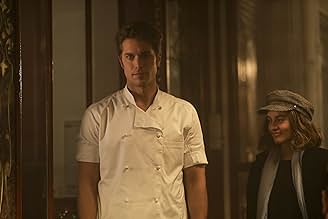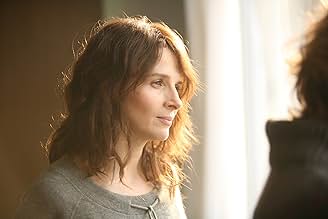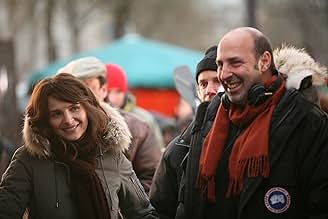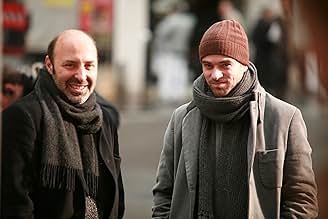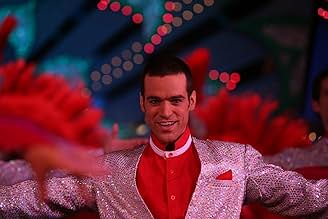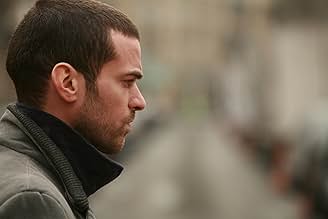Paris
- 2008
- Tous publics
- 2h 10min
NOTE IMDb
6,8/10
13 k
MA NOTE
Un ex-danseur a un problème cardiaque et malgré sa greffe, il ne lui reste que quelques mois à vivre. Il passe son temps à regarder la vie à Paris depuis son balcon. Sa soeur emménage avec s... Tout lireUn ex-danseur a un problème cardiaque et malgré sa greffe, il ne lui reste que quelques mois à vivre. Il passe son temps à regarder la vie à Paris depuis son balcon. Sa soeur emménage avec ses 3 enfants pour s'occuper de lui.Un ex-danseur a un problème cardiaque et malgré sa greffe, il ne lui reste que quelques mois à vivre. Il passe son temps à regarder la vie à Paris depuis son balcon. Sa soeur emménage avec ses 3 enfants pour s'occuper de lui.
- Réalisation
- Scénario
- Casting principal
- Récompenses
- 4 nominations au total
Avis à la une
To day I went to see "Paris" and hoped to win a trip to Paris from Sydney out of it! I had seen L'auberge espagnole and had no idea of the link! To top this, by accident I caught a french movie on TV to night perhaps already running for 10 minutes and it was Russian Dolls! Again I did not realise it was related, even called a Sequel to l'auberge espagnole! I enjoyed the 3 movies each on their own way. "Paris", my birth city, I did enjoy immensely, yet I could have imagine its story in any other city. Although it was nice to catch up with sites I have not seen for 25 years and left nearly 40 years ago, but to me it was very much this cocktail of people and their personal situation that moved me so much. Just like everyday life with its humor, sadness and pain all this with a comfortable music that actually did ease a little the pain. Again I thank those who write so well here and gave a concise and very interesting account of this wonderful film. I think one of these writings should appear with the main page of the film rather than tentative account like mine. Bu if by chance you are reading mine I'd like to let you know that if you go to see this movie, just go with the flow and you should not be disappointed.
Paris is a kaleidoscopic view of that great City of Light inhabited with a variety of individuals each of whom is consumed with life and love and living and dying. Cédric Klapisch has written and directed this richly populated canvas as a background of a tender story of a Moulin Rouge male dancer Pierre (Romain Duris) who is diagnosed with a terminal heart disease requiring transplantation if he is to survive. But in the end the many characters introduced in 'incidental stories' have become so interesting that, instead of providing simply a background for Pierre's portrait, they become an integral part of the drama as well as indelibly stamped on the viewer's mind.
Pierre has kept his illness secret, yet when faced with the dire concept of a transplant he confides in his sister Élise (Juliette Binoche), a single mother of three, who takes him in to fill his boring days of self confinement. There is a palpable magic between the two as Élise attempts to bring Pierre out into the world of hope and of living. Incidental to her life are trips to the market where she observes the lives of the grocers and discovers their private lifestyles, information shared freely with the viewer. A Parisian North African communicates with his brother at home with a postcard of Paris, seducing the brother to brave all odds to come to the city. We also meet a jaded art historian Roland Verneuil (Fabrice Luchini) whose father has just died, an event that devastates his emotional brother Philippe (François Cluzet): Roland proceeds to have an affair with a student but his physical awakening is abruptly altered by the realities of Parisian life while Philippe progresses through his seemingly mundane existence toward a surprise ending. The grocers seek adventures with a group of girls among whom is the ex-wife of one of the men and in the process we observe the varying reactions of interpersonal relationships tested away from the eyes of group participation. All of these stories are white noise to Pierre's situation, and though Élise is able to make Pierre 'dance again' at a party of his fellow dancers she organizes, in the end Pierre is left to care for Élise's children while Élise finally opens her frozen heart to a new romance. At this point Pierre receives the inevitable telephone call that a transplant is ready, and as he proceeds to the hospital he opens his mind to the beauties of Paris. Some of the vignettes we have observed are completed while most simply continue - just like life in the glorious city so often considered the city of love.
All of the many roles are enacted by gifted actors, the cinematography offers us a different view of Paris than that of postcards and travel brochures, and the musical score ranges from popular music to the haunting 'Gnossiemme No. 1' of Erik Satie which is Pierre's theme music. At times the viewer feels lost in the complex overlay of the many stories being told, but settling back in a chair and just absorbing the film results in an evening of Parisian intoxication.
Grady Harp
Pierre has kept his illness secret, yet when faced with the dire concept of a transplant he confides in his sister Élise (Juliette Binoche), a single mother of three, who takes him in to fill his boring days of self confinement. There is a palpable magic between the two as Élise attempts to bring Pierre out into the world of hope and of living. Incidental to her life are trips to the market where she observes the lives of the grocers and discovers their private lifestyles, information shared freely with the viewer. A Parisian North African communicates with his brother at home with a postcard of Paris, seducing the brother to brave all odds to come to the city. We also meet a jaded art historian Roland Verneuil (Fabrice Luchini) whose father has just died, an event that devastates his emotional brother Philippe (François Cluzet): Roland proceeds to have an affair with a student but his physical awakening is abruptly altered by the realities of Parisian life while Philippe progresses through his seemingly mundane existence toward a surprise ending. The grocers seek adventures with a group of girls among whom is the ex-wife of one of the men and in the process we observe the varying reactions of interpersonal relationships tested away from the eyes of group participation. All of these stories are white noise to Pierre's situation, and though Élise is able to make Pierre 'dance again' at a party of his fellow dancers she organizes, in the end Pierre is left to care for Élise's children while Élise finally opens her frozen heart to a new romance. At this point Pierre receives the inevitable telephone call that a transplant is ready, and as he proceeds to the hospital he opens his mind to the beauties of Paris. Some of the vignettes we have observed are completed while most simply continue - just like life in the glorious city so often considered the city of love.
All of the many roles are enacted by gifted actors, the cinematography offers us a different view of Paris than that of postcards and travel brochures, and the musical score ranges from popular music to the haunting 'Gnossiemme No. 1' of Erik Satie which is Pierre's theme music. At times the viewer feels lost in the complex overlay of the many stories being told, but settling back in a chair and just absorbing the film results in an evening of Parisian intoxication.
Grady Harp
The movie is mostly made of vignettes following several characters, loosely interconnected in the city of Paris. Sounds familiar. To be honest, I've grown tired of the many dramas borrowing that formula. It's become an epidemic, especially since Magnolia. And so, I did not expect to enjoy Paris all that much. But I loved it and it moved me by its stripped down, sincere approach.
Director and writer Cédric Klapisch, unlike several of his contemporaries, did not feel the need to employ convoluted means to link these characters, or end the movie on some sort of unifying, highly artificial bang. Klapish wisely elects to concentrate on building strong characters. He succeeds, so much so that it becomes easy for him to create simple, believable story lines for them. The real link between them? They are fallible, restless, tentative, longing... in other words, they are human.
There's a large cast here and Klepish mostly concentrates on a few of them. Many of the smaller parts are actually as intriguing as the bigger roles and I caught myself wondering what would happen to those characters. But Klapisch stays the course and ends the movie much like it began. A lot is left unresolved, much like life. No Hollywood ending here but I could certainly have followed those characters for another hour if need be.
A beautiful, stripped down story but enough subtext and genuine quality to make for a great and lasting movie experience.
Director and writer Cédric Klapisch, unlike several of his contemporaries, did not feel the need to employ convoluted means to link these characters, or end the movie on some sort of unifying, highly artificial bang. Klapish wisely elects to concentrate on building strong characters. He succeeds, so much so that it becomes easy for him to create simple, believable story lines for them. The real link between them? They are fallible, restless, tentative, longing... in other words, they are human.
There's a large cast here and Klepish mostly concentrates on a few of them. Many of the smaller parts are actually as intriguing as the bigger roles and I caught myself wondering what would happen to those characters. But Klapisch stays the course and ends the movie much like it began. A lot is left unresolved, much like life. No Hollywood ending here but I could certainly have followed those characters for another hour if need be.
A beautiful, stripped down story but enough subtext and genuine quality to make for a great and lasting movie experience.
A wonderfully complex study of both the city, and it's people on a wonderfully complex group of characters. Every one was as interesting as any other, regardless of the stature of the actor playing them, and you were invested in them all because of it. Juliette Binoche and Albert Dupontel were the most familiar names to me, but their characters were not allowed to dominate the story.
All along the way you were taken on journeys that were unsignposted and shocking, in some cases, because of it.
A quite extraordinary tale that deserves a far wider audience than it is likely to get. Overall the film was a shining example, in my opinion, of what makes French cinema the best in the world.
All along the way you were taken on journeys that were unsignposted and shocking, in some cases, because of it.
A quite extraordinary tale that deserves a far wider audience than it is likely to get. Overall the film was a shining example, in my opinion, of what makes French cinema the best in the world.
I saw this flick yesterday, and I have to say that I loved it. I am a big fan of Klapisch earlier work( Le peril jeune, Peut etre, chacun cherche son chat,...), but I am yet to see Russian dolls and the Spanish apartment.
I have found this movie in line with the other movies. Not frankly funny, but not only depressing. I thought that all characters are driven by one main emotion, which categorises them into the different stereotypes of Parisians: The intellectual, the artist, the grocer, etc. I have found hard to identify to only one, but rather you can connect with all of them at the same time. I have found out that all of the characters are, in fact, Paris, and I loved the movie for it. Klapisch is a great director and has always been able to capture a lot of complex emotions on camera. I have to say that he did it again in this opus.
His big talent is that he is able to make us reflect on our own lives through trying to understand his characters, and I guess that is why some people did not particularly like this movie as they were forced to have an inside look, but personally, I find it a great exercise.
The photography, avoiding clichés, is great and shows a different side of Paris. It is showing the Paris where people live, and not particularly where people holiday in.
All in all, a great performance by the whole cast and crew. Thanks again mister Klapisch!!!
I have found this movie in line with the other movies. Not frankly funny, but not only depressing. I thought that all characters are driven by one main emotion, which categorises them into the different stereotypes of Parisians: The intellectual, the artist, the grocer, etc. I have found hard to identify to only one, but rather you can connect with all of them at the same time. I have found out that all of the characters are, in fact, Paris, and I loved the movie for it. Klapisch is a great director and has always been able to capture a lot of complex emotions on camera. I have to say that he did it again in this opus.
His big talent is that he is able to make us reflect on our own lives through trying to understand his characters, and I guess that is why some people did not particularly like this movie as they were forced to have an inside look, but personally, I find it a great exercise.
The photography, avoiding clichés, is great and shows a different side of Paris. It is showing the Paris where people live, and not particularly where people holiday in.
All in all, a great performance by the whole cast and crew. Thanks again mister Klapisch!!!
Le saviez-vous
- AnecdotesAs end credits conclude, the choreographed dance show with Pierre shown earlier has a brief repeat.
- GaffesWhen the shop-owner of the bakery sell a baguette she asks for 80 cent, doesn't register it in the till, which has the figures 0,00 than it changes to 0,78 than back to 0,00 again.
- Bandes originalesMunivers de Paris
Written by Robert Burke (as R. Burke) and Loïc Dury (as L. Dury)
Performed by Kraked Unit
Universal Music Publishing
MGB / Kraked - ce qui me meut production
Meilleurs choix
Connectez-vous pour évaluer et suivre la liste de favoris afin de recevoir des recommandations personnalisées
- How long is Paris?Alimenté par Alexa
Détails
- Date de sortie
- Pays d’origine
- Site officiel
- Langue
- Aussi connu sous le nom de
- Париж
- Lieux de tournage
- Sociétés de production
- Voir plus de crédits d'entreprise sur IMDbPro
Box-office
- Budget
- 12 000 000 $US (estimé)
- Montant brut aux États-Unis et au Canada
- 1 010 194 $US
- Week-end de sortie aux États-Unis et au Canada
- 46 518 $US
- 20 sept. 2009
- Montant brut mondial
- 23 328 518 $US
- Durée
- 2h 10min(130 min)
- Couleur
- Mixage
- Rapport de forme
- 2.35 : 1
Contribuer à cette page
Suggérer une modification ou ajouter du contenu manquant


